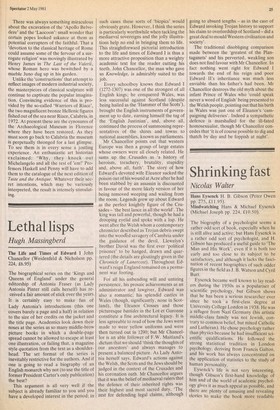Lethal lisps
Hugh Massingberd
The Life and Times _of Edward I John Chancellor (Weidenfeld & Nicholson pp. 224, £6.95) The biographical series on the 'Kings and Queens of England' under the general editorship of Antonia Fraser (as Lady Antonia Pinter still calls herself) has received a fair amount of stick over the years. It is certainly easy to make fun of Lady Antonia's introductions (this one covers barely a page and a half) in relation to the size of her credits on the jacket and the title page. Academics look down their noses at the series as so many middle-brow picture books in which a double-page spread cannot be allowed to escape at least one illustration, or failing that, a magazine style quotation from the text as a shoulderhead. The set format of the series is inevitably restrictive for the authors. And if one is going to read a biography of an English monarch why not (to use the title of former President Carter's only publication) the best?
This argument is all very well if the subject is already familiar to you and you have a developed interest in the period; in such cases these sorts of 'biopics' would obviously grate. However, I think the series is particularly worthwhile when tackling the mediaeval sovereigns and the jolly illustrations help no end in bringing them to life. This straightforward pictorial introduction to the life and times of Edward I is thus a more attractive proposition than a weighty academic text for the reader cutting his teeth. John Chancellor, the man who gave us Knowledge, is admirably suited to the job.
Every schoolboy knows that Edward (1272-1307) was one of the strongest of all English kings; he conquered Wales, was less successful against Scotland (despite being hailed as the 'Hammer of the Scots), brought the English instruments of government up to date, earning himself the tag of the 'English Justinian', and, above all, continued the process of summoning representatives of the shires and towns to national assemblies, known as parliaments.
Mr Chancellor points out that western Europe was then a group of large estates whose owners were all closely related. He sums up the Crusades as 'a history of heroism, treachery, brutality, stupidity and, above all, faith'. The story of how Edward's devoted wife Eleanor sucked the poison out of his wound at Acre after he had been stabbed by an assassin is discounted in favour of the more likely version of her being removed weeping and wailing from the room. Legends grew up about Edward as the perfect knightly figure of the Crusades 'the best lance in all the world'. The king was tall and powerful, though he had a drooping eyelid and spoke with a lisp. He went after the Welsh whom a contemporary chronicler described as Trojan debris swept into the wooded savagery of Cambria under the guidance of the devil. Llewelyn's brother David was the first ever 'political prisoner' to be hanged, drawn and quartered (the details are gloatingly given in the Chronicle of Lanercost). Throughout Edward's reign England remained on a permanent war footing.
Foi all his unbending will and untiring persistence, his prosaic achievements as an administrator and lawgiver, Edward was also a romantic; his splendid castles in Wales (though, significantly, none in Scotland), the Eleanor Crosses and those picturesque bastides in the Lot et Garonne constitute a fine architectural legacy. It is less agreeable to read of how the Jews were made to wear yellow uniforms and were then turned out in 1290; but Mr Chancellor is an able follower of F.W. Maitland's dictum that we should 'think the thoughts of our ancestors' and always manages to present a balanced picture. As Lady Antonia herself says, Edward's actions against the Welsh, the Scots and the Jews should be judged in the context of the Crusades and his coronation oath. Mr Chancellor argues that it was the belief of mediaeval rulers that the defence of their inherited rights was their highest and most sacred duty. 'The zest for defending legal claims, although going to absurd lengths — as in the case of Edward invoking Trojan history to support his claim to overlordship of Scotland — did a great deal to mould Western civilisation and society'.
The traditional disobliging comparison made between the 'greatest of the Plantaganets' and his perverted, weakling son does not find favour with Mr Chancellor. In fact nothing went right for Edward I towards the end of his reign and poor Edward II's inheritance was much less enviable than his father's had been. Mr Chancellor destroys the old myth about the infant Prince of Wales who 'could speak never a word of English' being presented to the Welsh people, pointing out that his birth in Wales was just one of Eleanor's 'campaigning deliveries'. Indeed a sympathetic defence is marshalled for the ill-fated hornosexualist, though Mr Chancellor concedes that 'it is of course possible to dig and thatch by day and be foppish at night'.


















































































 Previous page
Previous page